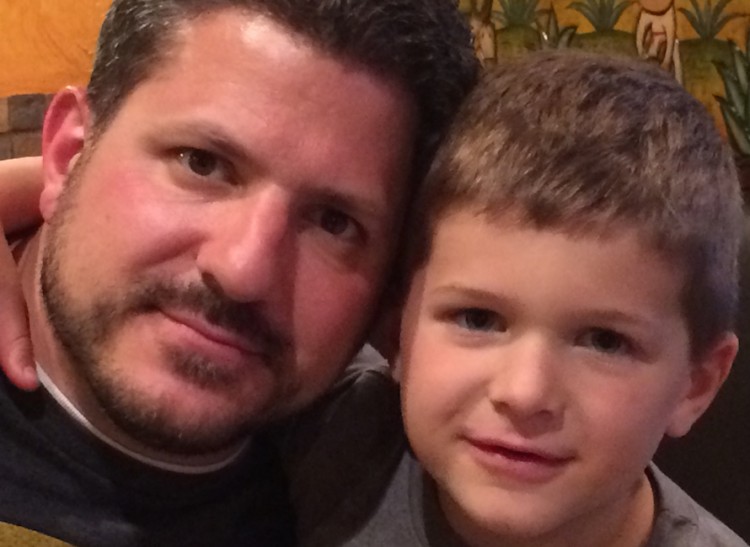My husband and I have a good marriage. Some days, I would even call it a great marriage.
You might say it’s a love story of sorts; I’ve known him for 19 years, and we’ve been married for almost 17.
When we were both in school, we were so broke at one point we could barely afford to order pizza, and we lived in an apartment where you could hear the rats tumbling through the walls in the middle of the night.
We’ve come a long way from rats in the walls, and now we can even order pizza with pepperoni, but we are in many ways the same two people we were back then. We laugh a lot. We like each other’s company, and we both think “Rocky II” is the best movie ever made.
I still find him as attractive as the day we first met — maybe even more so since he recently grew a beard and it looks really good on him.
But I have a confession to make. It’s kind of a secret, so I need you to come just a little closer. Bend your head to me, and I’ll whisper in your ear.
We are not good co-parents.
You know, the thing where two people are supposed to make decisions together and collaborate about their beloved children’s well-being and future and whether or not they should have another cookie even though they didn’t eat a single string bean at dinner?
Yeah, that.
After parenting together for 12 years, Joe and I, well, sometimes we aren’t on the same page. We’re not even reading the same book. In fact, we barely speak the same language.
I think this is mostly because I am right all the time. And Joe thinks I’m wrong and he’s right. But really, I am right — all the time.
It’s hard, this child-rearing thing. Like climbing-a-mountain hard, especially because Joe and I each think we know where we’re going and the best way to get there. We both want to be the tour guides.
On paper, it’s no surprise that we struggle to co-parent. The numbers are not in our favor.
There are five of them and two of us.
We had three kids in diapers. Twice.
One in 55 children are diagnosed with autism. We have one of them. His name is Jack.
Sometimes, it’s little things, like Joe letting our daughter wear her pink cowboy boots to school after I told her she needs to wear her sneakers. Or I tell Jack he doesn’t have to finish his math homework.
No matter the disagreement, the soft, whispery subtext is always the same.
Why are you undermining me? Are we in this together or not?
Then, there are the big things that turn the mountain into an explosive volcano right in front of our eyes.
For example, last week I was pretty mad at Jack. He had worn down my last nerve blaring the Beatles all afternoon and flipping out because his brother ate the rest of the ice cream and then he screamed a very bad word that begins with an “F” and rhymes with “duck.”
When Joe heard me get mad, he felt he had no choice but to also get mad. I didn’t need him to get mad. I needed him to tell me to go upstairs alone and chill out for a few minutes because we all know how much Jack loves the Beatles and ice cream and we’re working on the swearing.
The subtext in these situations is pretty obvious, too.
I don’t need you to interfere.
I am showing you my support by also getting mad.
I don’t need your support, I need you to find ice cream.
We are not together. I am alone.
Joe and I have a pretty specific division of labor when it comes to our family workload. He handles big school projects and I oversee homework and quizzes. I handle colds and boogers, and he is in charge of anything puke-related.
I will readily admit, Joe kind of drew the short straw when it comes to family responsibilities.
In the fact, one night after a particularly vicious bout of the stomach bug, 5-year-old Henry sat down in Joe’s lap after dinner and announced he will never be a father.
“Why not?” Joe asked him.
“Because. I don’t know how to rub someone’s back when they throw up. Like you do to me.”
We both want the same things for our family: happy, well-balanced, polite kids who will find their independence. But our styles and temperament are different.
In terms of parenting styles, I would say Joe falls into what I’ll call Category A. In Category A, kids should listen and do what we ask and we are the parents and therefore in charge. I’m in Category B. This category is a little more flexible. It takes into account children who are overtired and 12-year-olds who want to test their comedic wings. But a lot of times, people in Category B feel confused about who is in charge. We get tired easily.
See what I mean? Parenting. Hard.
Then, there’s our temperament.
Joe has exactly two speeds. Ninety percent of the time he’s an affable, lovable, fun, silly, affectionate guy. The other five percent, well, let’s just say someone has pushed his buttons just one time too many. He is loud, expressive and no-nonsense.
I have many speeds. I have my tired speed and my motivated speed. I have patience, and then sometimes I have no patience. I can go along all la-di-da and then, with no warning whatsoever, have a psychotic snap over something as innocuous as a towel left on the bathroom floor.
And autism unravels us. I wish I could say we’re getting better — more experienced — in parenting this boy, but the truth is every week, maybe every day, brings a whole new set of worries and challenges and behaviors.
How many more years will it take until we figure out what each of us needs? Will we ever unravel autism’s tricky knots?
The answer is, I do not know.
I do know this. Parenting is hard because it’s a rich combination of puke and chaos and temperament and style. It’s exhausting and complicated, heartbreaking and maddening. It’s wanting to be right but feeling as though you’re wrong. It redefines us all, but it especially redefines love stories.
Once upon a time, I thought a love story was a dark-haired college guy hoping he had enough money in his wallet to buy pizza with his fiancé. I thought it was first kisses and wedding dresses and snuggling together in an apartment with rats. I thought it was Rocky and Adrienne.
But it’s none of these.
It’s a dark-haired man with a beard bending tenderly over a little boy, and gently rubbing his back while he throws up in the bathroom.
“Daddy. I hope I can do it like you when I have kids, too.”


